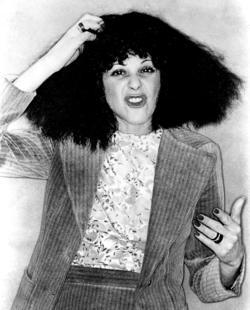Comic Renegades
Where were you when you heard the word “Jewess” on television for the first time? If you were watching TV in 1980, it’s safe to say it was during Gilda Radner’s “Jewess Jeans” faux-commercial on Saturday Night Live. If you’re a millennial, it was most likely in the premiere of Broad City, when Ilana refers to herself and her best friend Abbi as “two Jewesses trying to make a buck.” Either way, you probably laughed.
There are some comics who create entire worlds with a few gestures, a voice, and a hairstyle. Gilda Radner was one of these rare performers: her characters were fully realized in the span of a few seconds. Gilda is remembered for her tragic death at 42 from ovarian cancer, but she is thankfully even more widely recognized for her talent, her warmth, and the remarkable range of characters she created on Saturday Night Live (SNL): a rag-tag gang of one-of-a-kind, loveable weirdos.
There was Roseanne Roseannadanna, the tactless reporter with that trademark triangle of hair. Is any classic SNL character more iconic?
Who could forget Rhonda Weiss, the Jewish American Princess who embodied every stereotype about spoiled Jewish girls and brought us the aforementioned “Jewess Jeans?”
Or Miss Emily Litella, the hapless, hard-of-hearing commentator who mangled and misunderstood her topics hilariously—arguing to “save Soviet jewelry” or protesting “violins on television”—and gave the world her unforgettable face-saver: “never mind.”
All of Radner’s creations were imbued with her infectious energy: her commitment to the silliest of characters makes it impossible not to become as invested in them as she was. You get the sense that Gilda loved these women; that they were a part of her.
Gilda made everything look effortless, though we now know that her life was far from easy (before the cancer, she struggled for years with bulimia). She has become an icon not just to younger comics who grew up adoring her fearless performances on SNL, but to Jewish women searching for their own features on television: beautiful, vivacious Gilda’s enormous hair was her hallmark, and that cloud of frizz continues to inspire women to put down their flat irons and embrace their natural locks.
Gilda’s joy, her confidence as a comic, and her intelligence shone brightly though every wacky moment she spent onstage and onscreen. Her legacy casts a wide net: she was a magnetic performer, an unconventional beauty icon, a cancer activist, and a feminist inspiration, but the real reason we still watch Gilda’s sketches and songs and stage shows anywhere we can find them comes back to this: she was just so damn funny.
Broad City, created by Abbi Jacobson and Ilana Glazer, is the raunchy, aimless, supremely feminist buddy comedy we never knew we needed. But oh, how we need it: the show is single-handedly changing how women talk to each other (“queen” has entered the millennial lexicon with sudden force) and debunked the myth that women’s stories need to revolve around (male) love interests. Abbi and Ilana’s characters have sex, but traditional romantic relationships are not major plot points. Broad City goes out of its way to giddily tear down stereotypes about women on TV: no Sex and the City-style fairytale romance, no Mary Tyler Moore-esque workplace triumphs, and certainly no manic pixie dream girls in sight. Instead, we are presented with nutty, complex, fleshed-out female characters trying to survive in the comically expensive and exhausting environs of New York City.
Abbi Jacobson and Ilana Glazer write, produce, and star in Broad City. It’s easy to forget that they are actually successful executives, and that their zany characters, Abbi Abrams and Ilana Wexler, are exaggerated versions of their younger selves. Abbi and Ilana—the characters—are every 20-something in a dead-end job: trying to scrape together money for Lil’ Wayne concert tickets, getting locked out of their apartments, and dealing with unhygienic, inconsiderate roommates.
Ilana is the free spirit with inexhaustible swagger: she sleeps through most of her workday and refuses to commit sexually to one person or one gender. Her email address is ilanawexler@mindmyvagina.com. Abbi is an aspiring artist who strives to rise from janitor to trainer at the ritzy gym where she works and has Oprah’s face tattooed on the small of her back. She loves Bed Bath & Beyond.
Both characters also happen to be Jewish feminists who wear those labels with humor and ease: Ilana affectionately refers to Abbi and herself as “Jewesses” throughout the show. Like Gilda Radner, Abbi and Ilana breezily play on stereotypes of Jewish women with the comfort of those who grew up around them. Ilana’s ever-present frizzy curls read as an outcropping of her indomitable personality. Abbi keeps tweezers and a mirror at work, because weekly waxing doesn’t always cut it. They are everygirls, just (much) funnier than the rest of us. They are, as Abbi so aptly puts it, the feminist heroes we’ve been waiting for.




